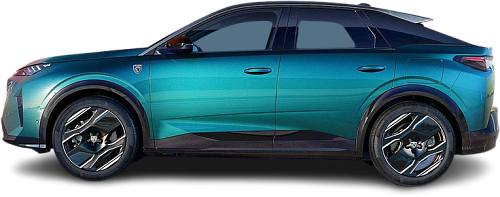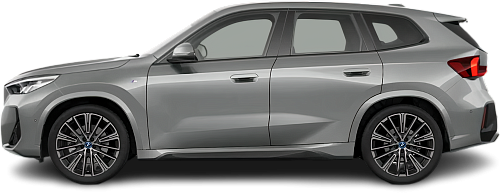USA EV Comparison: Peugeot e-3008 73 kWh AWD vs BMW iX1 xDrive30
Struggling to Decide? Let AI Help!
Your AI Summary Is Ready!
General Info
While both vehicles are currently in production, they are not sold in the United States.
The two vehicles share the same body style: SUV.
| Property | Peugeot e-3008 73 kWh AWD | BMW iX1 xDrive30 |
|---|---|---|
| Years of Production | 2024-… | 2022-… |
| Current Status | Produced | Produced |
| Country of Manufacture | France | Germany, India, China |
| Body Style | SUV | SUV |
| Market Availability | EU | EU |
| GCC Score | 6.7 | 6.4 |
Range and Efficiency
The Peugeot e-3008 73 kWh Dual Motor AWD (2024-…) boasts a greater real-world range, a larger battery, and superior energy efficiency compared to the BMW iX1 xDrive30 (2022-…).
| Property | Peugeot e-3008 73 kWh AWD | BMW iX1 xDrive30 |
|---|---|---|
| Range (WLTP) | 326 mi | 273 mi |
| Range (GCC) | 277 mi | 233 mi |
| Battery Capacity (Nominal) | 77 kWh | 66.5 kWh |
| Battery Capacity (Usable) | 73 kWh | 64.7 kWh |
| Efficiency per 100 mi | 26.4 kWh/100 mi | 27.8 kWh/100 mi |
| Efficiency per kWh | 3.79 mi/kWh | 3.6 mi/kWh |
| Range and Efficiency Score | 7.9 | 6.7 |
Charging
Both vehicles utilize a standard 400-volt architecture.
The Peugeot e-3008 73 kWh Dual Motor AWD (2024-…) offers faster charging speeds at DC stations, reaching up to 160 kW, while the BMW iX1 xDrive30 (2022-…) maxes out at 128 kW.
Both vehicles are equipped with the same on-board charger, supporting a maximum AC charging power of 11 kW.
| Property | Peugeot e-3008 73 kWh AWD | BMW iX1 xDrive30 |
|---|---|---|
| Max Charging Power (AC) | 11 kW | 11 kW |
| Max Charging Power (DC) | 160 kW | 128 kW |
| Architecture | 400 V | 400 V |
| Charge Port | CCS Type 2 | CCS Type 2 |
| Charging Score | 6.4 | 5.8 |
Performance
Both vehicles are all-wheel drive.
Although the Peugeot e-3008 73 kWh Dual Motor AWD (2024-…) has more power, the BMW iX1 xDrive30 (2022-…) achieves a faster 0-60 mph time.
| Property | Peugeot e-3008 73 kWh AWD | BMW iX1 xDrive30 |
|---|---|---|
| Drive Type | AWD | AWD |
| Motor Type | PMSM (front), PMSM (rear) | PMSM (front), PMSM (rear) |
| Motor Power (kW) | 240 kW | 230 kW |
| Motor Power (hp) | 322 hp | 308 hp |
| Motor Torque | 375 lb-ft | 364 lb-ft |
| 0-60 mph | 5.7 s | 5.4 s |
| Top Speed | 112 mph | 112 mph |
| Performance Score | 4.9 | 4.9 |
Dimensions
The Peugeot e-3008 73 kWh Dual Motor AWD (2024-…) is wider, but has a similar length and height to the BMW iX1 xDrive30 (2022-…).
Both models have similar wheelbase lengths.
| Property | Peugeot e-3008 73 kWh AWD | BMW iX1 xDrive30 |
|---|---|---|
| Length | 178.7 in | 177.2 in |
| Width (with Mirrors) | 74.6 in | 82.8 in |
| Width (w/o Mirrors) | 74.4 in | 72.6 in |
| Height | 64.6 in | 63.6 in |
| Wheelbase | 107.8 in | 106 in |
Cargo and Towing
Neither car is equipped with a frunk (front trunk).
The BMW iX1 xDrive30 (2022-…) has a towing capacity of up to 2645 lb, whereas the Peugeot e-3008 73 kWh Dual Motor AWD (2024-…) is not officially rated for towing in the US.
| Property | Peugeot e-3008 73 kWh AWD | BMW iX1 xDrive30 |
|---|---|---|
| Number of Seats | 5 | 5 |
| Curb Weight | 4750 lb | 4596 lb |
| Cargo Volume (Trunk) | 16.6 ft3 | 17.3 ft3 |
| Cargo Volume (Max) | - Cargo Volume (Max) | 52.8 ft3 |
| Cargo Volume (Frunk) | - Cargo Volume (Frunk) | - Cargo Volume (Frunk) |
| Towing Capacity | - Towing Capacity | 2645 lb |
| Cargo and Towing Score | 6.2 | 6.5 |




